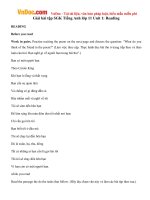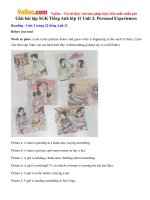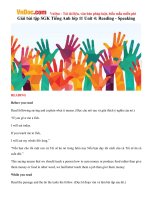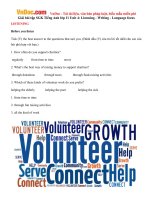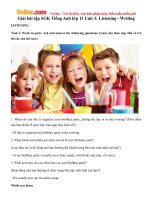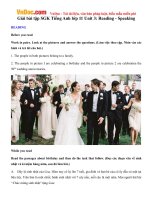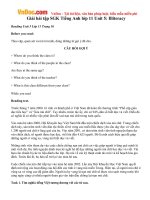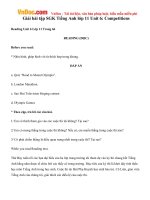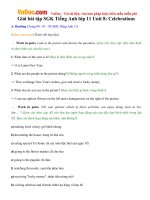Giải bài tập SGK tiếng Anh lớp 11 Unit 13 HOBBIES
Bạn đang xem bản rút gọn của tài liệu. Xem và tải ngay bản đầy đủ của tài liệu tại đây (320.39 KB, 9 trang )
VnDoc - Tải tài liệu, văn bản pháp luật, biểu mẫu miễn phí
Giải bài tập SGK tiếng Anh lớp 11 Unit 13 HOBBIES
A. Reading (Trang 146-147-148 SGK Tiếng Anh 11)
Before you read (Trước khi bạn đọc)
The pictures below present some hobbies. Work with a partner and say which ... . (Các bức tranh dưới
đây thể hiện một vài sở thích. Làm việc với bạn học và nói xem bạn thích làm gì vào thời gian rỗi.)
- What do you often do in your free time?
I like watching TV, reading English books, playing games, go fishing, playing football, go shopping, ...
- What are your hobbies?
My hobbies are listening music, reading book and watching TV, ...
While you read (Trong khi bạn đọc)
Read the passage and then do the tasks that follow. (Đọc đoạn văn và làm các bài tập theo sau.)
Hướng dẫn dịch:
Có vài thứ tôi thích làm khi rảnh rỗi. Chúng là các sở thích của tôi.
Thú tiêu khiển tôi thích nhất là chơi đàn ghi-ta. Chú tôi, một tay đàn ghi-ta tài hoa, đã dạy
tôi đàn. Bây giờ tôi có thể chơi vài điệu đơn giản. Tôi còn bát đầu hát khi đàn, nhưng chưa
thành công lắm. Chú tôi bảo tôi cần luyện tập đều đặn là tôi có thể làm được. Chú tôi rất
giỏi đệm đàn ghi-ta cho người khác hát và tôi thán phục chú lắm.
Một sở thích khác của tôi là nuôi cá cảnh. Tôi có một bể cá nhỏ để nuôi một số cá con
khác nhau. Vài con tôi mua ở cửa hàng, vài con khác tôi bắt được ở ngoài ruộng gần nhà.
Chúng trông thật đẹp khi bơi quanh bể. Tôi thích quan sát chúng và mẹ tôi cũng thích thế.
Tôi cũng sưu tầm tem nữa. Tuy nhiên, tôi không cho mình là một nhà sưu tập tem đầy
khao khát. Thật ra tôi chỉ góp nhặt những con tem trên các phong bì cũ mà bà con hay bạn
bè tôi bỏ ra cho tôi. Hầu hết các con tem tôi có là trong nước. Thỉnh thoảng tôi lấy được
tem ở nước Nga, Mỹ, Anh quốc, Úc, Trung Quốc và các quốc gia khác. Tôi giữ những con
tem hiếm vào quyển album nhỏ. Những con tem thông dụng hơn thì tôi hay cho người
khác và nếu như chẳng ai cần thì tôi chỉ việc bỏ chúng đi.
Cũng còn có nhiều thú tiêu khiển khác mà tôi đam mê một thời gian nhưng chúng không
thú vị bằng các sở thích mà tôi vừa nói tới. Chúng thật sự làm tôi bận rộn và tôi thấy vui
khi làm những điều đó.
VnDoc - Tải tài liệu, văn bản pháp luật, biểu mẫu miễn phí
Task 1. The words and phrases below appear in the passage. Use a dictionary ... . (Các từ và cụm từ
dưới đây xuất hiện trong đoạn văn. Sử dụng từ điển để có nghĩa của chúng. Sau đó dịch ra tiếng Việt.)
1. accomplished = well-trained, skilled: tài ba, tài hoa
2. accompanying = going with a singer, using a musical instrument: đệm (đàn)
3. modest = humble, unassuming: nhỏ, khiêm tốn
4. avid = eager: say mê
5. discarded = throw away: đã bị bỏ đi
6. indulge in = allow oneself the pleasure of: đam mê vào (một việc gì đó)
7. keep me occupied = keep me busy: làm cho tôi bận rộn/bịu
Task 2. Answer the questions. (Trả lời các câu hỏi.)
1. What is the writer's first hobby? (Thú tiêu khiển đầu tiên của tác giả là gì?)
=> It is playing the guitar.
2. Is the writer an accomplished guitarist? (Tác giả có phải là một tay ghi-ta tài ba không?)
=> No, he is not.
3. Why does the writer admire his uncle? (Tại sao tác giả khâm phục ông chú của mình?)
=> Because he is an accomplished guitarist and he is good at accompanying people singing with his
guitar.
4. What is the writer's second hobby? (Sở thích thứ hai của tác giả là gì?)
=> It is keeping fish.
5. How did he collect his fish? (Ông ấy đã sưu tầm cá như thế nào?)
=> He bought some from the shop and collected some from the rice field near his house.
6. What kind of stamp collector is the writer? (Tác giả là người sưu tầm tem loại nào?)
=> He is not an avid stamp collector.
7. Where does he collect the stamps? (Ông ấy sưu tầm tem ở đâu?)
=> He collects stamps from discarded envelopes, his relatives, and his friends.
VnDoc - Tải tài liệu, văn bản pháp luật, biểu mẫu miễn phí
8. Which does the writer get more of, local stamps or foreign stamps? (Tác giả có loại tem nào nhiều
hơn, tem địa phương hay tem nước ngoài?)
=> He gets more of local stamps than foreign stamps.
9. What does the writer do with die less common stamps and with the common ones? (Tác giả làm gì
với loại tem hiếm và làm gì với loại tem thường?)
=> He keeps the less common ones inside a small album. The common ones he usually gives away to
others or throws them away.
After you read (Sau khi bạn đọc)
- Work in groups. Talk about your hobby. (Làm việc nhóm. Nói về sở thích của bạn.)
Gợi ý:
Đoạn văn ngắn:
I have many hobbies, such as, playing football, game online and swimming. However, my favourite one
is reading manga, a kind of Japanese picturebooks. Whenever i have spare time, i would like to lie on
my bed and enjoy thrilling and interesting adventures described through beautiful pictures. Moreover,
reading these books makes me feel comfortable and relaxed after a hard-working day in my
university.Finally, sometimes, they make me think about life's lessons of love, friendship and family by
touching stories , which is the main reason why i like this kind of books.
Đoạn văn dài:
In my daily life, I have several hobbies such as cooking, surfing, listening to music and so on. However,
I like reading books the most for some reasons. Firstly, reading makes me feel comfortable after many
long stressful hours at school. I actually like comic books because they contain lots of colorful and
interesting images that keep my spirit relax. Secondly, reading books provides me a great deal of
diverse knowledge of many fields. For instance, I can know more specific culture of each country in
The World's Cultures book. In addition, I can know more things about different life of various animals
that are living around the world in the Discovery of Animals World book. Finally, reading helps to
enhance my vocabulary in both Vietnamese and English language. In Vietnamese book, I can learn
many traditional folks or proverbs that help me understand more deeply the beauty of my mother tongue.
About English books, I can improve my English reading comprehension skill in study. Besides, my
communication skill with the foreigners will be better, too. In conclusion, I really like reading books,
for it brings many good things to me. I see it as an useful activity to learn how to make life more
meaningful and beautiful.
VnDoc - Tải tài liệu, văn bản pháp luật, biểu mẫu miễn phí
B. Speaking (Trang 148-149 SGK Tiếng Anh 11)
Task 1. Work in pairs. Say which of the following you should like/not like to do and why. (Làm việc
theo cặp. Nói điều nào dưới đây bạn thích/không thích làm và tại sao.)
Gợi ý:
A: What is your hobby?
B: My hobby is reading book.
A: Why do you like it?
B: Because it makes me happy/comfortable ... .
Task 2. Lan is talking to Huong about her hobby of collecting books. Practise reading their dialogue
with a partner. (Lan nói chuyện với Hương về sở thích sưu tầm sách. Thực hành bài đối thoại của họ với
một bạn học.)
Hướng dẫn dịch:
Hương: Lan, sở thích của bạn là gì?
Lan: À, mình thích sưu tập sách.
Hương: Bạn có thể cho mình biết bạn sưu tập sách như thế nào?
Lan: Được chứ, việc này phải được thực hiện thường xuyên. Bất cứ khi nào mình tìm
thấy một cuốn sách thú vị mình mua nó ngay lập tức.
Hương: Bạn mua sách ở đâu?
Lan: Mình mua từ một hiệu sách gần nhà mình và một số sách khác từ gian hàng sách cũ.
Đôi khi bạn bè của mình, cha mẹ mình cho mình một ít.
Hương: Làm thế nào để bạn sắp xếp bộ sưu tập của bạn?
Lan: Mình phân loại chúng thành các loại khác nhau và mỗi thể loại để ở một góc của kệ
sách với một thẻ tên trên đó.
Hương: Lan, bạn định làm gì tiếp theo?
Lan: Minh nghĩ rằng mình sẽ tiếp tục làm cho bộ sưu tập của mình phong phú hơn.
VnDoc - Tải tài liệu, văn bản pháp luật, biểu mẫu miễn phí
Task 3. Work with a partner. Make a similar dialogue about collecting stamps. Use the suggestions
below. (Làm việc với một bạn học. Thực hiện một cuộc đối thoại tương tự về việc sưu tập tem. Sử dụng
các gợi ý dưới đây.)
Gợi ý:
A: What is your hobby, Nam?
B: Well, I like collecting stamps.
A: Could you tell me how you collect your stamps?
B: Well, this must be done reguiarly. Whenever a new kind of stamp is issued. I buy it immediately.
And I ask my friends, inland or overseas, to give me the stamps in their countries. Sometimes I
exchange my stamps with my friends'.
A: How do you organize your collection?
B: I classify them according to the countries or to the categories: animals, plants, flowers, ...
A: What do you plan to do next, Nam?
B: I think I'll continue to make my collection richer and richer.
C. Listening (Trang 150-151 SGK Tiếng Anh 11)
Before you listen (Trước khi bạn nghe)
- Work with a partner. Write down three benefits of reading books. Then share ... . (Làm việc với bạn
học. Viết 3 lợi ích của việc đọc sách. Sau đó chia sẻ ý kiến của bạn với lớp.)
Three benefits of reading books:
+ Books help to widen our knowledge.
+ Books give us valuable experience.
+ Books are good sources of information.
- Listen and repeat.
magazine: tạp chí
continually: liên tục
otherwise: mặt khác
gigantic: khổng lồ
VnDoc - Tải tài liệu, văn bản pháp luật, biểu mẫu miễn phí
profitably: có lợi
available: sẵn có để dùng
bygone: quá khứ, đã qua
ignorantly: sự ngu dốt
While you listen (Trong khi bạn nghe)
Task 1. You will hear a student talk about his hobby. Listen to his talk and ... . (Bạn sẽ nghe thấy một
học sinh nói chuyện về sở thích của bạn ấy. Nghe câu chuyện của bạn ấy và xác định xem các phát biểu
là đúng (T) hoặc sai (F).)
1. T
2. F
3. F
4. F
5. T
6. T
7. T
8. F
Task 2. Listen again and write the missing words. (Nghe lại và viết các từ còn thiếu.)
1. wonderful
2. disease
4. certainly
5. ignorantly
3. jungle
After you listen (Sau khi bạn nghe)
Work with a partner. Talk about the disadvantages of over-reading (reading too much).(Làm việc với
bạn cùng học. Nói về những tác hại của việc đọc quá nhiều.)
Gợi ý:
Some disadvantages of over-reading:
+ Becoming shortsighted
+ Not having enough physical exercise
+ Lacking practical knowledge
+ Becoming a bookworm/ overweight
Gợi ý hội thoại:
A: Reading books has a lot of benefits; however it will have some disadvantages if you read too much.
B: Why?
A: Reading too much may make you become shortsighted, ...
D. Writing (Trang 151 SGK Tiếng Anh 11)
VnDoc - Tải tài liệu, văn bản pháp luật, biểu mẫu miễn phí
Write about your collection, real or imaginary, following these guidelines. (Viết về bộ sưu tập của bạn,
thật hoặc tưởng tượng, theo các hướng dẫn.)
Gợi ý:
Đoạn văn 1:
My hobby is collecting stamps, I started to collect stamps 6 years ago. I have been collecting both local
stamps and foreign stamps from the letters of friends and relatives.
I classify the stamps into categories. I put stamps of animals, flowers, birds... on different pages. 1 keep
them in two albums, one for local and the other for foreign ones.
Collecting stamps helps me to broaden my knowledge about the world around me and it is also an
effective way to be a good geography.
I plan the stamp exhibitions to learn from experienced stamp collectors and I can expose my collection
at an exhibition in the future.
Đoạn văn 2:
At the moment I am collecting dolls and teddy bears. I like to collect them as they give me a great
feeling to the memorable days of my childhood. I can never forget the day when it was happened to be
my 6 years old celabration's day. I was upset at that time because my parents have gone away for a
business trip leaving me alone with my grandmother. However, it was a big surprise to me that they
came back the moment I was to blow off the candles. They appeared with a huge present in their hands,
wishing me happy birthday with a Snow White doll. From that day onward, I started loving to collect
dolls and up to now, I have got as many as a thousand dolls including teddy bears, mostly I collected
them from the internet. My dream for the future is to open a gift's shop with all kind of dolls and bears.
Hopefully it is in the near future.
Đoạn văn 3:
My hobby is collecting stamps. Collecting stamps helps to broaden my knowledge about the world
around me and it is also an effective way to be good at geography. My stamp collection began when I
was 11 years old. At that time I just collected the stamps from discarded envelops that my relative and
my friends gave me. I love the pictures and the information in these stamps. I often keep the less
common inside a small album and give the common ones to others. I keep the collection for myself and
show it to my friends who are also interested in collecting stamps. I think I will continue to make my
collection richer and richer.
E. Language Focus (Trang 151-152-153 SGK Tiếng Anh 11)
VnDoc - Tải tài liệu, văn bản pháp luật, biểu mẫu miễn phí
Grammar
Exercise 1. Write the following sentences after the model, paying attention to the subject of the
sentence. (Viết các câu sau theo mẫu, chú ý đến chủ ngữ của câu.)
Example:
The man save her the book.
→ It was the man who gave her the book.
Gợi ý:
1. It was the boy who visited his uncle last month.
2. It was my mother who bought me a present on my birthday.
3. It was Huong and Sandra who sang together at the party.
4. It was Nam's father who got angry with him.
5. It was the boys who played football all day long.
6. It was the girl who received a letter from her friend yesterday.
7. It was his presence at the meeting that frightened the children.
Exercise 2. Write the following sentences after the model, paying attention to the object of the verb.
(Viết các câu sau theo mẫu, chú ý đến tân ngữ của động từ.)
Example:
The boy hit the dog in the garden.
→ It was the dog that the boy hit in the garden.
Gợi ý:
1. It is English that the man is learning.
2. It was the book that the woman gave him.
3. It was the postcard that she sent her friend.
4. It was the book that Hoa borrowed from Long.
5. It was his grandfather who/whom the little boy greeted in a strange language.
VnDoc - Tải tài liệu, văn bản pháp luật, biểu mẫu miễn phí
6. It was the policeman who/whom the pedestrian asked a lot of questions.
7. It was the stranger who/whom the dog barked at.
Exercise 3. Write the following sentences after the model, paying attention to the adverbial modifier of
the sentence. (Viết các câu sau theo mẫu, chú ý đến trạng ngữ của câu.)
Example:
She bought him a present at the shop.
→ It was at the shop that she bought him a present.
Gợi ý:
1. It was in the garden that the boy hit the dog.
2. It was for tea that she made some cakes.
3. It was for him that his faster repaired the bicycle.
4. It was on his birthday that she presented him a book.
5. It was in Britain that he met his wife.
6. It was from the shop that she bought that present.
7. It was at 8:00 am that the meeting started.
